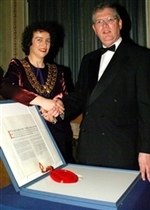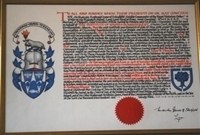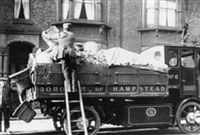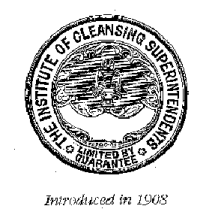CIWM History
Evolution of the Institution
The Chartered Institution of Wastes Management (CIWM) was first established as 'The Association of Cleansing Superintendents of Great Britain' on 25th June 1898, with waste managers from northern and Scottish cities as the main driving force. It was incorporated as "The Institute of Cleansing Superintendents" in 1908 (see logo below), "The Institute of Public Cleansing" in 1928 and then as "The Institute of Wastes Management" in 1981. It became "The Chartered Institution of Wastes Management" on award of its Royal Charter in 2003.
The Royal Charter

The Institution was awarded its Royal Charter of Incorporation by Her Majesty the Queen on 1st March 2002 - and presented to the President of the time, Dr C O'Brien, on 5th March 2002 (see photo below). The Charter recognises that the Institution has a solid record of achievement; is financially sound; represents a field of activity unique to it and is pre-eminent in that field. The Institution is expected to have a substantial proportion of its members educated to first degree level in a relevant discipline and to have codes of professional ethics and personal professional development programmes. The award of the Charter has to be seen by Government as a whole as demonstrably in the public interest - in effect it has become "part of the fabric of the nation" and has a responsibility to work for the benefit of all inhabitants of the United Kingdom and overseas.
Through gaining the Royal Charter the Institution is now able to confer the award of Chartered Waste Manager to its Members. In mid 2009 the Institution now has over 2,450 Chartered Wastes Managers - growing at around 6% per year.
Armorial Bearings

The Institute of Wastes Management was awarded a coat of arms and a badge in 1998 (see photo and diagram below). For a copy of the Armorial text and an explanation of the Coat of Arms follow these links. The Institution is also entitled to use a badge - the oak tree inside a shield - but for all practical purposes the coat of arms is used. All of the armorial bearings were transferred across to the new Chartered Institution of wastes Management in 2003.
History
Behind the way we recycle and manage waste today lies a fascinating history.
The last century of that history and the first hundred years of the CIWM were captured by Lewis Herbert in 1998, when he wrote the Institution's centenary history.
The History of the Institute of Wastes Management (1898 - 1998)
This history, and his 2007 update, trace our roots from tackling a public health nightmare in Victorian cities to the multi-billion pound operations of today that reduce, reuse and recycle waste, and then deal with the residue.
Centenary History of Waste & Waste Managers in London & South East England
Changing Waste and Society Priorities Over the Past 150 Years
Alternate chapters in the Centenary History publication, chart the social changes that reshaped waste management and recycling.

- 19th Century - the public health nightmare in Victorian cities and towns, and the special contribution that effective solid waste management made in improving urban living and life expectancy
- 1890s to 1920s - social changes before and during the First World War, including technological changes like vehicles replacing horse power
- 1920s to 1960s - the challenges of rapidly changing waste streams and service needs, including the wartime salvage drive and the impact of rising post-war incomes and consumption
- 1970s onwards - decades when it was recognised that increased legislation had an essential role to play because hazardous and other wastes were outstripping society's capacity to manage them, and prevent environmental damage.
The Institution and People who Reshaped Waste and Recycling
In parallel, the Centenary History publication also charts the first three phases of the Institution and the leading characters who shaped its evolution from the time it was set up in Sheffield on 25 June 1898.

1898 to 1908 - the Association of Cleansing Superintendents of Great Britain
The origins of the Institution in local authority waste and cleansing managers from Scotland and Northern England, and the cities which saw the most rapid population growth following industrialisation
1908 to 1928 - the Institute of Cleansing Superintendents Expanded to include waste and cleansing managers from cities and towns across Britain
1928 to 1972 - the Institute of Public Cleansing from, whose members until the 1960s were all men, and almost exclusively local authority men at that, but with increasing links and affiliations from equipment manufacturers and the new breed of private waste companies
1970s onwards - The Institute of Solid Wastes Management , quickly renamed the Institute of Wastes Management , which expanded coverage to all waste streams, and the diversity and complexity of hundreds of different private sector as well as public sector organisations.
Commitment to professionalism across the industry, and to the full sharing of knowledge in the pursuit of excellence in Britain and overseas
Recognition that waste means resource and recovery opportunities, along with the need to tackle impacts on people and the environment
Need for continuous training and development for staff at all levels within the industry
Effective resourcing of services to achieve solutions that deliver both high quality and minimum environmental impacts. As one of the founders James Jackson aptly put it 'nothing is too good for cleansing'.
Many 'new' ideas also look remarkably similar to new ideas from previous decades, and there is much that we can learn and recycle from the past. There are also lessons from what did not work well. For as the 1998 history concluded, borrowing from philosopher George Santayana , those who forget the lessons of history are doomed to make the same mistakes all over again.
If you want more information or have historical material to share please contact Lewis Herbert on 01223 721027 or lewis@wastewise.org.uk